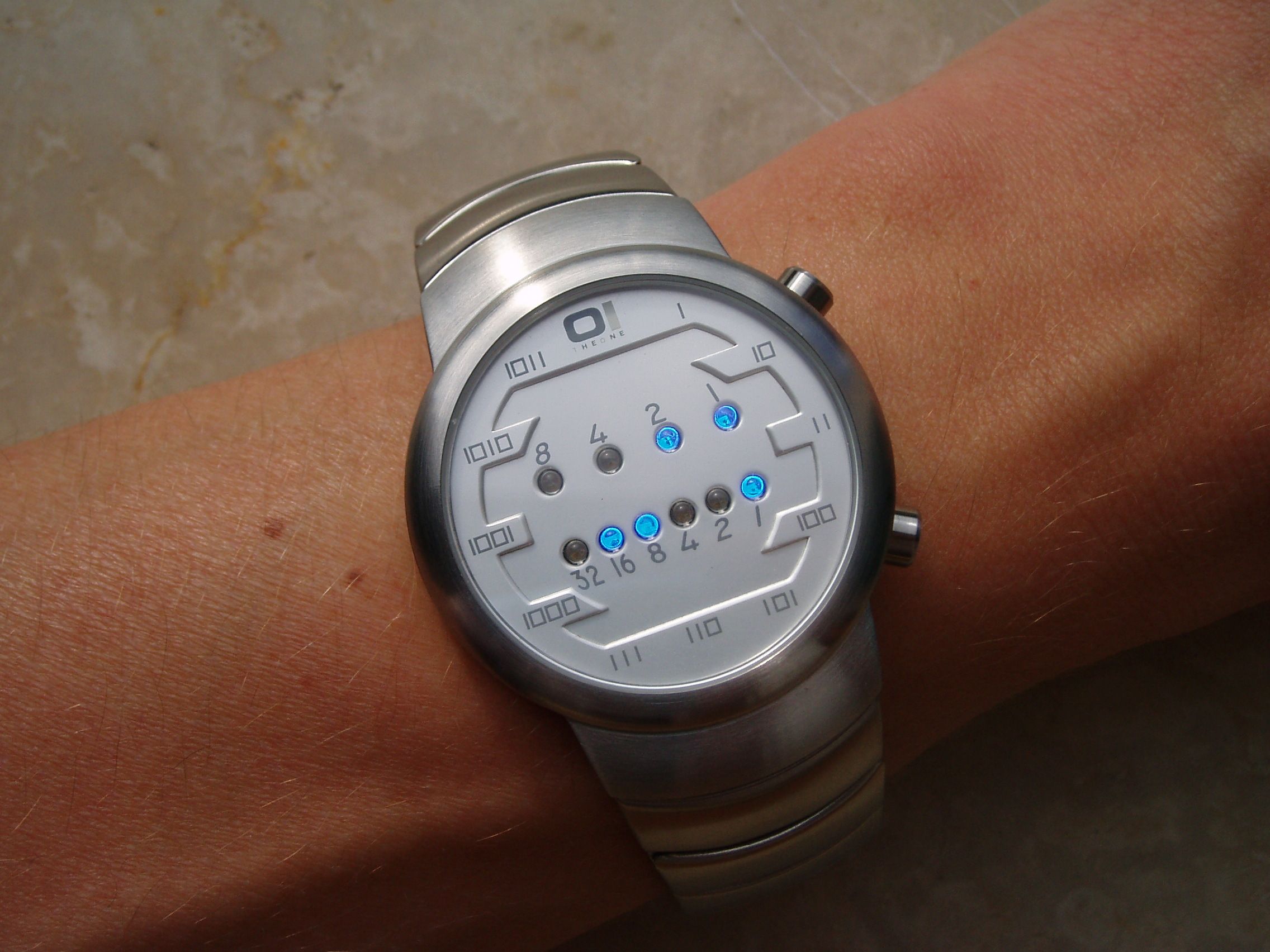二进制手表顶部有 4 个 LED 代表 小时(0-11),底部的 6 个 LED 代表 分钟(0-59)。每个 LED 代表一个 0 或 1,最低位在右侧。
- 例如,下面的二进制手表读取
"3:25"。
(图源:WikiMedia - Binary clock samui moon.jpg ,许可协议:Attribution-ShareAlike 3.0 Unported (CC BY-SA 3.0) )
给你一个整数 turnedOn ,表示当前亮着的 LED 的数量,返回二进制手表可以表示的所有可能时间。你可以 按任意顺序 返回答案。
小时不会以零开头:
- 例如,
"01:00"是无效的时间,正确的写法应该是"1:00"。
分钟必须由两位数组成,可能会以零开头:
- 例如,
"10:2"是无效的时间,正确的写法应该是"10:02"。
示例 1:
输入:turnedOn = 1 输出:["0:01","0:02","0:04","0:08","0:16","0:32","1:00","2:00","4:00","8:00"]
示例 2:
输入:turnedOn = 9 输出:[]
提示:
0 <= turnedOn <= 10
方法一:枚举组合
题目可转换为求 i(i∈[0,12)) 和 j(j∈[0,60)) 所有可能的组合。
合法组合需要满足的条件是:i 的二进制形式中 1 的个数加上 j 的二进制形式中 1 的个数,结果等于 turnedOn。
方法二:二进制枚举
利用 10 个二进制位表示手表,其中前 4 位代表小时,后 6 位代表分钟。枚举 [0, 1 << 10) 的所有数,找出合法的数。
class Solution:
def readBinaryWatch(self, turnedOn: int) -> List[str]:
return [
'{:d}:{:02d}'.format(i, j)
for i in range(12)
for j in range(60)
if (bin(i) + bin(j)).count('1') == turnedOn
]class Solution:
def readBinaryWatch(self, turnedOn: int) -> List[str]:
ans = []
for i in range(1 << 10):
h, m = i >> 6, i & 0b111111
if h < 12 and m < 60 and i.bit_count() == turnedOn:
ans.append('{:d}:{:02d}'.format(h, m))
return ansclass Solution {
public List<String> readBinaryWatch(int turnedOn) {
List<String> ans = new ArrayList<>();
for (int i = 0; i < 12; ++i) {
for (int j = 0; j < 60; ++j) {
if (Integer.bitCount(i) + Integer.bitCount(j) == turnedOn) {
ans.add(String.format("%d:%02d", i, j));
}
}
}
return ans;
}
}class Solution {
public List<String> readBinaryWatch(int turnedOn) {
List<String> ans = new ArrayList<>();
for (int i = 0; i < 1 << 10; ++i) {
int h = i >> 6, m = i & 0b111111;
if (h < 12 && m < 60 && Integer.bitCount(i) == turnedOn) {
ans.add(String.format("%d:%02d", h, m));
}
}
return ans;
}
}class Solution {
public:
vector<string> readBinaryWatch(int turnedOn) {
vector<string> ans;
for (int i = 0; i < 12; ++i) {
for (int j = 0; j < 60; ++j) {
if (__builtin_popcount(i) + __builtin_popcount(j) == turnedOn) {
ans.push_back(to_string(i) + ":" + (j < 10 ? "0" : "") + to_string(j));
}
}
}
return ans;
}
};class Solution {
public:
vector<string> readBinaryWatch(int turnedOn) {
vector<string> ans;
for (int i = 0; i < 1 << 10; ++i) {
int h = i >> 6, m = i & 0b111111;
if (h < 12 && m < 60 && __builtin_popcount(i) == turnedOn) {
ans.push_back(to_string(h) + ":" + (m < 10 ? "0" : "") + to_string(m));
}
}
return ans;
}
};func readBinaryWatch(turnedOn int) []string {
var ans []string
for i := 0; i < 12; i++ {
for j := 0; j < 60; j++ {
if bits.OnesCount(uint(i))+bits.OnesCount(uint(j)) == turnedOn {
ans = append(ans, fmt.Sprintf("%d:%02d", i, j))
}
}
}
return ans
}func readBinaryWatch(turnedOn int) []string {
var ans []string
for i := 0; i < 1<<10; i++ {
h, m := i>>6, i&0b111111
if h < 12 && m < 60 && bits.OnesCount(uint(i)) == turnedOn {
ans = append(ans, fmt.Sprintf("%d:%02d", h, m))
}
}
return ans
}function readBinaryWatch(turnedOn: number): string[] {
if (turnedOn === 0) {
return ['0:00'];
}
const n = 10;
const res = [];
const bitArr = new Array(10).fill(false);
const createTime = () => {
return [
bitArr.slice(0, 4).reduce((p, v) => (p << 1) | Number(v), 0),
bitArr.slice(4).reduce((p, v) => (p << 1) | Number(v), 0),
];
};
const helper = (i: number, count: number) => {
if (i + count > n || count === 0) {
return;
}
bitArr[i] = true;
if (count === 1) {
const [h, m] = createTime();
if (h < 12 && m < 60) {
res.push(`${h}:${m < 10 ? '0' + m : m}`);
}
}
helper(i + 1, count - 1);
bitArr[i] = false;
helper(i + 1, count);
};
helper(0, turnedOn);
return res;
}impl Solution {
fn create_time(bit_arr: &[bool; 10]) -> (i32, i32) {
let mut h = 0;
let mut m = 0;
for i in 0..4 {
h <<= 1;
h |= if bit_arr[i] { 1 } else { 0 };
}
for i in 4..10 {
m <<= 1;
m |= if bit_arr[i] { 1 } else { 0 };
}
(h, m)
}
fn helper(res: &mut Vec<String>, bit_arr: &mut [bool; 10], i: usize, count: usize) {
if i + count > 10 || count == 0 {
return;
}
bit_arr[i] = true;
if count == 1 {
let (h, m) = Self::create_time(bit_arr);
if h < 12 && m < 60 {
if m < 10 {
res.push(format!("{}:0{}", h, m));
} else {
res.push(format!("{}:{}", h, m));
}
}
}
Self::helper(res, bit_arr, i + 1, count - 1);
bit_arr[i] = false;
Self::helper(res, bit_arr, i + 1, count);
}
pub fn read_binary_watch(turned_on: i32) -> Vec<String> {
if turned_on == 0 {
return vec![String::from("0:00")];
}
let mut res = vec![];
let mut bit_arr = [false; 10];
Self::helper(&mut res, &mut bit_arr, 0, turned_on as usize);
res
}
}
